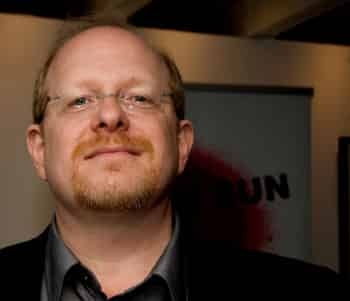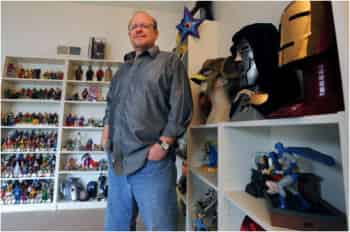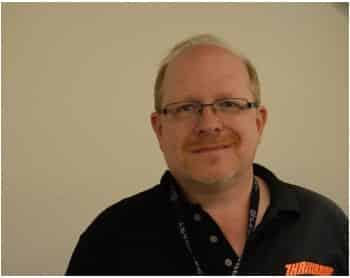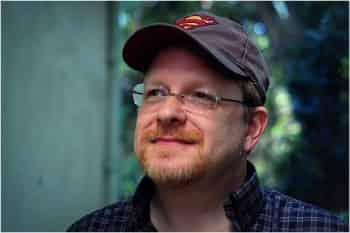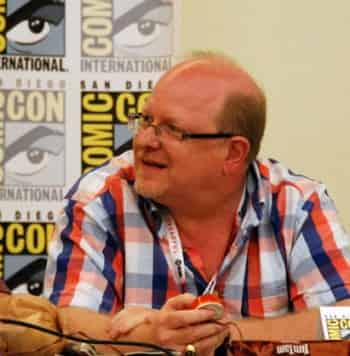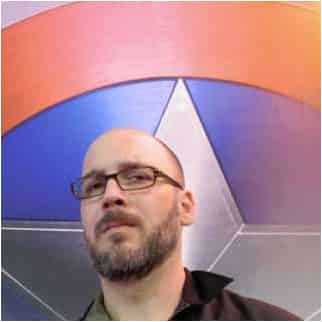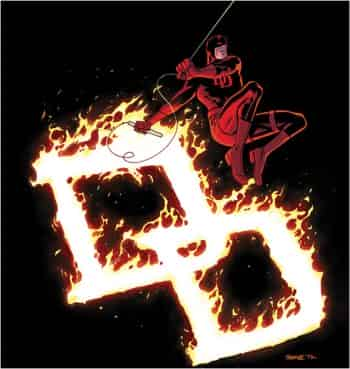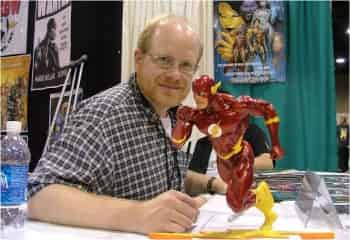
Mark Waid
The traps of repetition
In an era where everything cultural has already been written or done—which is especially true for comic books, where Spiderman, Superman, Batman and friends have already been through hundreds of stories—successfully producing a totally original work is a constant challenge. We found this gem in an interview of Mark Waid:
“I was hesitant at first because it seemed like such a dark way to go. And I also didn’t want to do the 800th ‘Oh he has cancer in a superhero book! What will the superhero do? Surely there’s a way to fix it! Oh wait, you can’t beat cancer.’ I don’t want to do that kind of story. You know, the story where Daredevil walks around the Marvel Universe for an issue trying to get people to cure cancer for him and being told, ‘We can go to the Negative Zone, Daredevil, but we can’t cure cancer.’ So that’s the first trap you have to avoid when doing that kind of story. And second, it’s so dark a circumstance, and I like Foggy.” (“Mark Waid Talks Daredevil, Hulk, Everything,” March 27, 2013, http://ca.ign.com/articles/2013/03/27/mark-waid-talks-daredevil-hulk-everything)
So there are always new angles to develop.
Marketing your characters may stunt their development
Mark Waid has expressed an interesting opinion about seeking profit with Web publications: “Waid commented that the tendency toward merchandizing may encourage the slow-down or freeze of new developments in a character since ‘every character becomes a beach towel’ in the end” (Hannah Means-Shannon, “On the Scene: WonderCon 2013,” comicsbeat.com, March 30, 2013.). This simple comment summarizes the conflict that may arise between financial profitability and artistic integrity.
Shaking up the conventions
We’re coming back to ideas we’ve already discussed but with new references that provide food for thought. There’s a fine line between formula and conventions in any type of film. In his analysis of Die Hard, Darren points out that the movie worked well because it made use of all the action-film conventions without turning the script into a checklist of items to cover (Darren, “Non-Review Review: Die Hard,” them0vieblog.com, January 8, 2013).
The concept of conventions may be more difficult to transcend in the West, where stories are generally built around a clash between two or more elements that is ultimately resolved by one dominating the other. It can become difficult to develop new ideas within such a paradigm. In this context killing off the main character can be a way to gain some dramatic momentum. Unfortunately this cliché is used too often to try to breathe new life into a series, and it no longer fazes readers who know very well that the character will come back from the grave (Mike Romo, “RIP Peter Parker (Again), RIP My Faith in Marvel (Again),” http://ifanboy.com, July 1, 2013). Returning from the dead cancels out the dramatic impact and any possible learning because too often this return means a return to the status quo or to the situation that preceded the tragedy (Steve Morris, “Second Opinion: Batman # 17” http://comicsbeat.com, February 15, 2013). Morris also believes that these concepts are those of the authors and are not always consistent with the spirit of the characters or the series being developed.
One solution is offered by Mark Waid in his stories that emphasize more intimate stakes. In this sense, McMillan is targeting key elements of Hawkeye, developed by Matt Fraction: “The excitement here is that Hawkeye doesn’t wear his costume all that much and acts like a real life human being once in a while. He cracks some jokes and has some sense of his own mortality when he or his friends get shot at. He is hopeless at superheroics (i.e. fallible)” (Graeme McMillan, “What Makes Hawkeye So Special?” Newsarama, May 8, 2013). To successfully convey smaller-scale dramas, the author needs the time to develop them. Daniel Champion offers an interesting idea: “That’s ‘story’ and so often in comics, we don’t see it. A story is about something and is told through moments that happen. In comics, we only ever seem to get a bunch of things that happen, with no ‘about’ […] and that’s a waste” (Daniel Champion, “Comics is Sh*t,” www.comicbookdaily.com, January 29, 2013.). The story happens beyond the events taking place in the panels. Taking the time to develop a story can mean introducing characters that will only reveal themselves later on (Graeme McMillan, “…Who is that Again?” Newsarama, January 30, 2013).
The viability of webcomics
We’re coming back to ideas we’ve already discussed but with new references that provide food for thought. Brian Wood recalls a simple truth about the comic book industry: “This is a job. This is a business, not a hobby or a social activity. That may sound a little cold, and it doesn’t mean I don’t get immense creative satisfaction from doing what I do (if I didn’t, I’d go be a stockbroker or something) but it’s about finding the right balance. Not making business decisions based on being a fan, or social pressure, or making too many allowances for the quirks of this industry” (Graem McMillan, “Wood: Comics is a Business, Not a Hobby or a Social Activity,” Newsarama, January 2, 2013).
Falcone however adds an important nuance that makes a big difference: the idea of teamwork. “Compared to other industries, I find it surprising and overwhelming how pedagogy and mentorship is so deeply ingrained as part of the comic book industry. I’ve seen creator after creator look at someone’s work and give advice and pass on years of wisdom because someone did it for them. Comic creators believe in returning kindness and helping aspiring talent” (Anthony Falcone, “Breaking into the Comics the Marvel Way,” www.comicbookdaily.com, May 30, 2013).
Despite this, the commercial aspect can’t be ignored because creating comics costs money even if you are publishing your work online yourself. This is because comic require a high production rate, which entails certain labour costs (“Mark Waid on the True Cost of Digital,” http://www.comicsbeat.com, January 1, 2013).
These costs mean that even artists like Mark Waid wonder about how to generate revenue (“Holiday Interview #22 – Mark Waid,” www.comicsreporter.com, January 22, 2013). In the same interview Waid sees the industry moving to a more direct and personal relationship between creator and fans. In such an environment how is it possible to generate mass revenues without losing the direct contact?
Focussing on the characters
We’ve already discussed Mark Waid at length, along with his writing techniques focusing on character rather than on large and complex machinations. We feel this is a product of our time. In his analysis of Skyfall, FamousMonster states, “The screenplay, written by John Logan, Neal Purvis, and Robert Wade, is a swaggering return to classic Bond, with an intense focus on characterization and action, as opposed to some of the more recent Bond films, which seem primarily concerned with car chases and stunt sequences” (Movie Review: Skyfall, FamousMonster, http://www.geeksofdoom.com, November 9, 2012).
A few months before, Mendes spoke similarly about the movie: “Yes, they do have a history […]. It’s much more personal story than your traditional ‘I’ve got a nuclear device and I’m going to blow up the world, Mr. Bond.’ […] You know, just making it bigger is not going to make it any more scary” (“We’ve Been Expecting You Mr. Bond,” Dan Jolin, Empire, n° 280, October 2012, p. 94-103.).
Without even being aware of it, Joss Whedon may possibly go in the same direction for his Avengers 2. “On the tone of the film, he [Whedon] said that The Avengers 2 would go deeper instead of bigger. Honestly after a huge battle like the one we saw in the first film, it be nice to get a more personal story and take a step back from the big hefty action. Apparently he wants to go so deep and personal that it will be painful.” (“Joss Whedon Talks ‘Avengers 2′ Script, ‘S.H.I.E.L.D.’ TV Show & Marvel Films,” eelyajekiM, www.geeksofdoom.com, January 11, 2013).
Timing Issues
There is a phenomenon that occurs in various forms of art (music, movies, etc.), where one artist’s production is in tune with the tastes of the day. When Mark Waid was asked about the increased interest in his work, he said, “I’m not doing anything I haven’t been doing the last 10 or 15 years in terms of how I approach story, how I approach characters, how I approach narrative. At this exact moment there seems to be room in the marketplace for stuff that is a little less formulaic and a little less like what we’ve seen before. A little less dark. A little less dystopic, without being quote-unquote “fun.” Maybe that’s what people are responding to. I don’t know” (“Interview #22 – Mark Waid,” comicsreporter.com, January 10, 2013).
The reverse can also occur: an artist can have a very successful work, and then do something similar that just doesn’t take off. This happens not only in the arts but also in any form of innovation.
Levels of violence
A few months ago, Mark Waid stated, “Writing evil and writing violence, if you’re clever and do it right, can be two entirely different sets of visuals.” At the same time, Waid said he was sorry he had killed some of the characters he had created (DC Comics: Allegations of Editorial Strong-Arming in the Old 52, Russ Burlingame, comicbook.com, August 26, 2012). Without making excuses, we see different levels in the deaths of characters. At the lowest level of the pyramid, there is cannon fodder: interchangeable henchmen who are regularly eliminated or captured and who are totally anonymous. Their anonymity means that their death has no repercussions, since they were never truly alive for the reader. A little higher up are the villains whose death is the ultimate punishment for their misdeeds. We find this type of sacrificed lambs more problematic, since they are brought into the story to trigger a reaction from the hero, and their death aims to produce a dramatic effect. In some stories, like the James Bond movies, to give only one example, these characters are so predictable that we as viewers choose not to get attached to them. And lastly, there is the level at which a character’s death, whether or not it is natural, represents that character’s culmination. Violence is one thing, and having a character evolve is another, even if that requires the death of someone from his or her entourage.
Compression and decompression
“We don’t often spend enough time on ramifications in mainstream comics, so here was a place to build a whole storyline around them.” —Ed Brubaker (“The Ed Brubaker ‘Captain America’ Exit Interview,” David Brothers, comicsalliance.com, November 1, 2012).
Brubaker’s statement reminded us of a piece written by Renaud Pasquier (« “Homeland” met en scène le nouveau Jack Bauer de l’Amérique parano », Le Nouvel Observateur, September 29, 2012), in which he analyzes the first season of the TV series Homeland: ” However, this story won’t at all engage in a furious investigation fueled by the fateful ticking of the clock. What gives fiction its rhythm is time, not external or mechanical time, but something intimate and organic. The irregular and non-linear time of experience; the time of suspicions, doubts and hesitations; the time of emotions, thoughts and memories; but also, the time of delusions” [translation].
In an interview with Mark Waid, Tom Spurgeon used the word “decompression” to talk about Waid’s writing style (Interview # 22 – Mark Waid, www.comicsreporter.ccom, January 10, 2013). We like the image the word creates. We’d like to refine this a little and suggest there is an analogy to be made with the accordion: you need to let air into the instrument (decompression) in order to produce sounds (compressions). If our stories operate only in action mode (compression), they can no longer breathe, there is no longer time to come to understand the characters, their motivations, their evolution. Compression and decompression: that’s our recipe.
Mark Waid
Mark Waid is an author we only got to know recently through his work on Daredevil, which really impressed us. His stories seem almost “anticlimactic.” For example, in the seventh issue, Daredevil faces a snowstorm. And issue 12 is focused on the time when Matt and Foggy were studying law and had a confrontation with their teacher. The fight scenes are relatively short and rarely occupy a whole issue.
Curiously, without seeming spectacular at first glance, Mark Waid’s writing is stimulating and these issues are some we often reread. We also recently learned that Mark Waid doubles as a thinker on the impact of the Internet on comic production.
Comments from fans
In an interview by e-zine The Beat, Bill Jemas, founder of 360eps and former member of the Marvel team, said: “You can be more creative for less money and less time with better feedback with comics than in any medium I’ve ever been around” (“Interview: Former Marvel COO Bill Jemas Tells Us How to Wake the F#ck Up,” comicsbeat.com, September 13, 2012). This is in line with Marc Alan Fishman saying that he managed the risks of his creative projects by listening to the comments of his true fans (“Everything We Do, We Do It for You,” Marc Alan Fishman, comicmix.com, October 27, 2012).
Without denying the value of fan comments, it’s important to know what changes are being made to improve the product and which ones are done just to make readers happy. Jesse Alexander called the third season of the TV series Alias definitely the series’ worst: “[…] and we’d change up things a little based on viewers’ reactions to certain things. But because we didn’t have any chance to deal with that the year [season four], we’ve been operating in a vacuum where we’ve really been free to craft a story without any outside influence. I think that’s probably helped us stay focused on our goal for the end of the year” (“Revelations,” Alias–The Official Magazine, Vol. 1, No. 10, May-June 2005, p.64-65).
The point isn’t to reject readers’ comments; quite the opposite. But if we write, it’s because we have something to say. As Mark Waid said, you have to please yourself and it all depends more or less on you if down the line your work is read by a lot of other people (Interview #22 – Mark Waid, www.comicsreporter.com, January 10, 2013).


